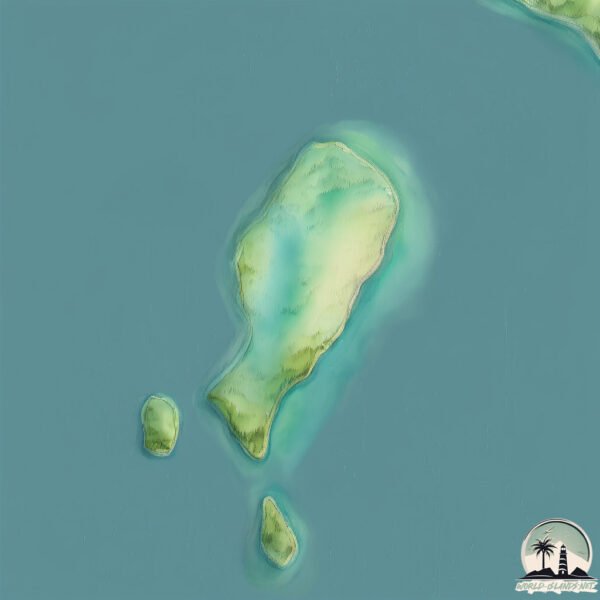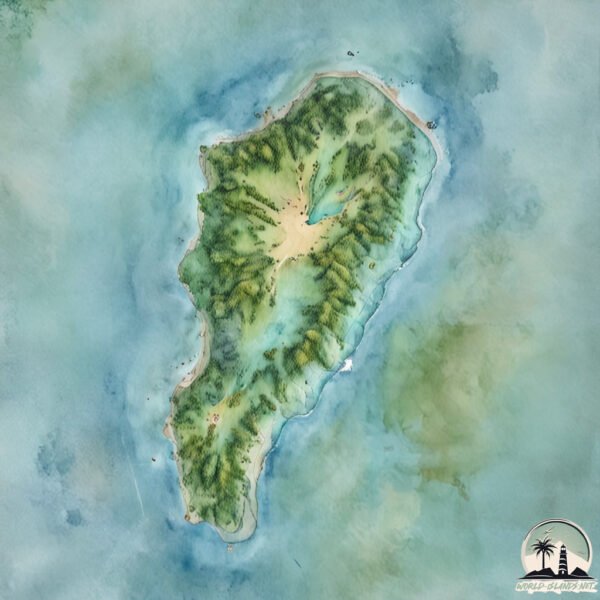Guitar Island


Welcome to Guitar Island, a Tropical island in the Andaman or Burma Sea, part of the majestic Indian Ocean. This guide offers a comprehensive overview of what makes Guitar Island unique – from its geography and climate to its population, infrastructure, and beyond. Dive into the details:
- Geography and Size: Explore the island’s size and location.
- Climate and Weather: Weather patterns and temperature.
- Topography and Nature: Uncover the natural wonders of the island.
- Infrastructure and Travelling: Insights on reaching, staying, and making the most of your visit.
- News and Headlines: Latest News.
Geography and size of Guitar Island
Size: 1.157 km²
Coastline: 5.2 km
Ocean: Indian Ocean
Sea: Andaman or Burma Sea
Continent: Seven seas (open ocean)
Guitar Island is a Small Island spanning 1.2 km² with a coastline of 5.2 km.
Archipel: Andaman Islands – Situated in the Bay of Bengal, the Andaman Islands are part of the Indian territory and are known for their picturesque beaches, clear waters, and lush forests. These islands are home to a variety of indigenous tribes and have a rich biodiversity, including unique flora and fauna. The Andamans also have a significant history, notably during the British colonial period.
Tectonic Plate: Burma – Also known as the Burma Plate, it’s a minor tectonic plate in Southeast Asia, largely covering Burma (Myanmar) and parts of the Indian Ocean. It’s involved in the subduction process under the Eurasian Plate, contributing to seismic activity in the region.
The geographic heart of the island is pinpointed at these coordinates:
Latitude: 12.34799805 / Longitude: 92.91343763
Climate and weather of Guitar Island
Climate Zone: Tropical
Climate Details: Tropical Monsoon Climate
Temperature: Hot
Climate Characteristics: Characterized by heavy rainfall, high humidity, and uniformly high temperatures, but with a distinct short dry season. It features a seasonal reversal of prevailing wind directions.
Topography and nature of Guitar Island
Timezone: UTC+05:30
Timezone places:
Max. Elevation: 33 m
Mean Elevation: 24 m
Vegetation: Evergreen Broadleaf Forest
Tree Coverage: 79%
The mean elevation is 24 m. The highest elevation on the island reaches approximately 33 meters above sea level. The island is characterized by Plains: Flat, low-lying lands characterized by a maximum elevation of up to 200 meters. On islands, plains are typically coastal lowlands or central flat areas.
Dominating Vegetation: Evergreen Broadleaf Forest
Characterized by dense, lush canopies of broadleaf trees that retain their leaves year-round. These forests are typically found in tropical and subtropical regions and are known for their high biodiversity. Guitar Island has a tree cover of 79 %.
Vegetation: 2 vegetation zones – Low Diversity Island
Islands with two distinct vegetation zones offer slightly more ecological variety. These zones could be due to differences in elevation, moisture, or other environmental factors. While still limited in biodiversity, these islands may offer a contrast between the two zones, such as a coastline with mangroves and an inland area with grassland.
Infrastructure and Travelling to Guitar Island
Does the island have a public airport? no.
There is no public and scheduled airport on Guitar Island. The nearest airport is Veer Savarkar International Airport / INS Utkrosh, located 80 km away.
Does the island have a major port? no.
There are no major ports on Guitar Island. The closest major port is PORT BLAIR, approximately 75 km away.
The mean population of Guitar Island is 26 per km². Guitar Island is Gently Populated. The island belongs to India.
Continuing your journey, Long Island is the next notable island, situated merely km away.
India is classified as Emerging region: BRIC: Brazil, Russia, India, and China – Economies noted for their rapid growth and increasing influence on global affairs. The level of income is Lower middle income.
News – Latest Updates and Headlines from Guitar Island
Stay informed with the most recent news and important headlines from Guitar Island. Here’s a roundup of the latest developments.
- Lunar New Year, Taylorville and More Things To Do on Long Island this Weekend - Mommy Poppinsby "Long Island island" - Google News on 6 February 2026
Lunar New Year, Taylorville and More Things To Do on Long Island this Weekend Mommy Poppins
- EXCLUSIVE: St. James family seeks public’s help finding missing 15-year-old boy - News12 | Long Islandby "Long Island island" - Google News on 23 January 2026
EXCLUSIVE: St. James family seeks public’s help finding missing 15-year-old boy News12 | Long Island
- Best Italian restaurants on Long Island 2026 - Newsdayby "Long Island island" - Google News on 22 January 2026
Best Italian restaurants on Long Island 2026 Newsday
- At least 100 cats rescued from deplorable conditions inside Long Island breeder's home - NBC New Yorkby "Long Island island" - Google News on 21 January 2026
At least 100 cats rescued from deplorable conditions inside Long Island breeder's home NBC New York
- Dreaming out loud: International Guitar Night brings virtuosos to Island stages - Port Alberni Valley Newsby "Guitar Island island" - Google News on 11 January 2026
Dreaming out loud: International Guitar Night brings virtuosos to Island stages Port Alberni Valley News
- Patchy freezing rain, wet weather to cause icy spots Wednesday morning on Long Island - News12 | Long Islandby "Long Island island" - Google News on 6 January 2026
Patchy freezing rain, wet weather to cause icy spots Wednesday morning on Long Island News12 | Long Island
- Check out Long Island's holiday displays for a good cause - News12 | Long Islandby "Long Island island" - Google News on 22 December 2025
Check out Long Island's holiday displays for a good cause News12 | Long Island
- Long Island Lutheran High School (Brookville, NY) Basketball - MaxPreps.comby "Long Island island" - Google News on 22 December 2025
Long Island Lutheran High School (Brookville, NY) Basketball MaxPreps.com
- Newsday's All-Long Island boys soccer team 2025 - Newsdayby "Long Island island" - Google News on 19 December 2025
Newsday's All-Long Island boys soccer team 2025 Newsday
- Long Island Lutheran High School (Brookville, NY) Girls Basketball - MaxPreps.comby "Long Island island" - Google News on 19 December 2025
Long Island Lutheran High School (Brookville, NY) Girls Basketball MaxPreps.com
Please note: The data used here has been primarily extracted from satellite readings. Deviations from exact values may occur, particularly regarding the height of elevations and population density. Land area and coastline measurements refer to average values at mean high tide.
